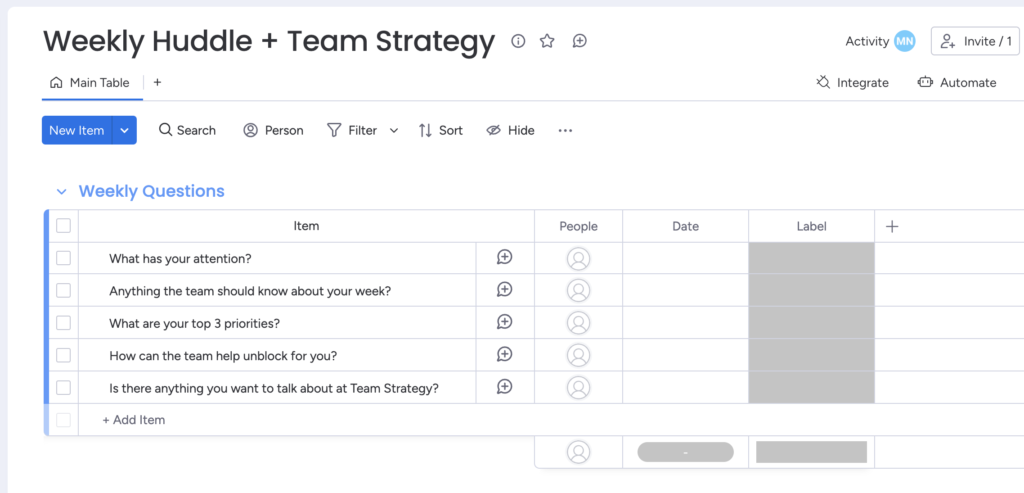What Oreos and team meetings have in common
Every Thanksgiving at approximately 6:30pm my mother starts her high-intensity kitchen circuit: a lunge to mix the brussel sprouts, a deep squat to peer down at the illuminated oven, a long jump to baste the bird. At the end of the routine, the competitor leans against the counter and beckons the attention of her rapt audience: "Let me make this clear as day: I will never do this again!" And yet, each year, November rolls around, and there she is, in her competitive garb (apron + sneakers), ready to attack the circuit once more. My mother’s performance has become my family’s most treasured (and amusing) holiday ritual.
No doubt many of you have holiday rituals too: you might watch football or share a note of gratitude with your dinner companions. Or maybe you resist the hubbub altogether and head to your favorite take-out spot. Every day we perform rituals, big and small. Why do we insist on engaging in these practices? Some might argue that ritual is simply about control, but I wonder if there’s something more intrinsic that motivates us.
Take eating as an example. In the Power of Rituals in Life, Death, and Business, Carmen Nobel makes the case that people who perform a ritual before they eat actually believe that the food tastes better. That must be why I do that wine swirl thing before I take a sip of an exorbitantly priced two-buck chuck at a restaurant and then say to the waiter, “Oh, that’s delightful!” When I eat an Oreo, I must rigidly adhere to these 3 steps:
- Twist the cookie in order to separate it into two halves.
- Scrape off the sweet filling with teeth.
- Consume each cookie with exaggerated chomps, creating the loudest crunch effect possible.
To imagine just eating an Oreo sandwich intact… no, no, no! Apparently, my neurosis has a basis in actual research. “With consumption, rituals seem to work because they increase your involvement in the experience" (Nobel, 2013).1 In other words, rituals help us engage more fully in whatever it is we're doing. As a result, we are more likely to be fulfilled.
At Franklin Street, we extend the power of rituals to our work. We use rituals to increase predictability in an increasingly unpredictable world; to help us feel a sense of shared purpose as a team; and to express our core values to the communities we work with. I’ll share a couple of examples.
Predictability
Every Monday, we host a team huddle during which we answer the same 5 questions:

Predictability is comforting. It’s soothing to know that on Monday afternoons we gather to connect and run through our week’s priorities. When we ask, “What has your attention?” we are inviting people to share – openly and humanly – about what’s occupying their headspace. Rituals around connection help teams foster “psychological safety”, and teams with higher psychological safety feel safer taking more creative risks and embracing mistakes as learning opportunities (Gallo, 2023).2
Shared purpose
We also use rituals to stay focused on our collective purpose. Once a month, we set aside a half day to pause and reflect on our strategy. This intermission from the everyday buzz helps us ground in our shared purpose. We remember why we’re doing what we do and focus together on strengthening our strategy. The result is that we find meaning in our work, and that doesn’t just feel good – we actually do better work. Teams who view their work as meaningful are “more motivated, happier, and more productive” (Senz, 2022).3
"Rituals around connection help teams foster “psychological safety”, and teams with higher psychological safety feel safer taking more creative risks and embracing mistakes as learning opportunities."
— Amy Gallo, Harvard Business Review
Core values
Rituals also help us express our espoused values in tangible ways. Every December we give our closest partners and collaborators resources to donate to any organization that they care about. We do this because we believe in contributing directly to communities that we value.
So, as you wind down for your holiday break, take stock of the little weird rituals that bring you comfort and joy (how do you eat an Oreo?). And ask yourself: what's one small ritual I can introduce to my team at work? Rituals at work don’t have to be complicated or over-the-top. They can be as simple as asking a good question at the beginning of every team meeting. Rituals help us connect more deeply to each other and our shared purpose.
- Nobel, C. (2013). The Power of Rituals in Life, Death, and Business. Harvard Business School: Working Knowledge, Research & Ideas. ↩︎
- Gallo, A. (2023). What is Psychological Safety? Harvard Business Review: Leadership and Managing People ↩︎
- Senz, K. (2022). Rituals at Work: Teams That Play Together Stay Together. Harvard Business School: Working Knowledge, Research & Ideas ↩︎
